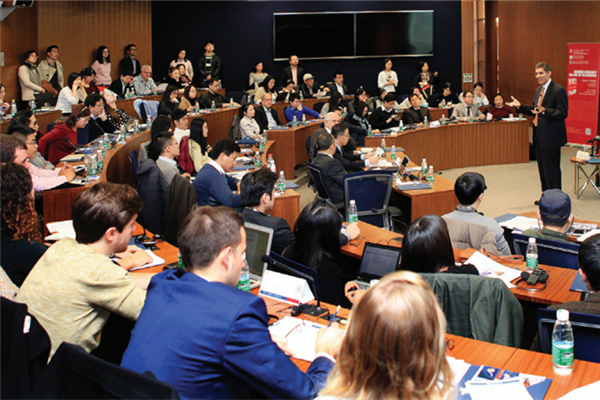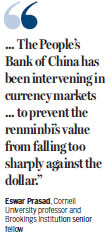An economic realist
 |
|
Eswar Prasad, a senior fellow at the Brookings Institution, talks about his new book Gaining Currency: The Rise of the Renminbi, at the Brookings-Tsinghua Center for Public Policy in Beijing on Nov 3, 2016. [Photo provided to China Daily] |
Reforms
Prasad, whose latest book is titled, Gaining Currency: The Rise of Renminbi, sees huge risks in China's financial system. The huge corporate debt, local government debt and the inefficiency in the system are showing up in non-performing loans.
"What I found remarkable is that the Chinese government has created enough maneuvering space so that they are able to deal with these crises," he said.
While some of the problems have worsened over time, Prasad noted that the Chinese economy has also been growing, and there are more resources to deal with the problems.
The question to him has become whether there will be an explosive crisis that brings the Chinese economy to its knees.
"I think it's unlikely that it will happen," he said.
According to traditional indicators comparing the amount of corporate debt to total debt, Prasad believes that China seems that it could have crashed by now.
But he wanted to remind people of some important factors. Key among them are the small external debt relative to the size of the economy and relative to the country's foreign currency reserves as well as the high savings rate among the population.

The overall government balance sheet does not look that bad to him. Much of the non-performing loans are made by state-owned banks to state-owned enterprises (SOEs).
"Somebody has to pay the bill. Ultimately, it's going to be the Chinese households," he said.
"So there is going to be a big bill to pay; the Chinese government has to fix the problem, otherwise the problems are going to grow bigger."
The economist, who now travels to China several times a year for various conferences and events, believes that the notion of growing out of the problems is less viable for China. There has to be better growth, the kind that does not create as many problems, he said.
China, Prasad believes, has to come face to face at some point with the problems, mostly in the banking system over nonperforming loans. The question to be asked is: How expensive it is going to be to fix the problem?
He emphasized that getting the finance part right is crucial for China, because Chinese save so much domestically. "And locating that domestic savings to the most productive sector is going to be crucial for China's economic development and more balanced growth," he said.
In his view, China's reforms have become imbalanced. In the past year and a half, he saw that China made progress in financial market reforms such as liberalization of deposit interest rates, efforts to open up the capital account, and to let the currency be more market-determined.
He wishes there were more progress, but pointed out that his major concern lies on the real side of the economy, where reforms have not progressed as much.
He listed the reforms of the SOEs, the hukou (household registration) system and fiscal reform, issues that he believes the Chinese government knows quite well.
Prasad believes it's equally important to promote institutional reform, such as by having a better corporate governance structure, a better legal framework for a market-oriented system and more corporate and government transparency with data.
China hand
Now widely sought for his expertise on the Chinese economy, Prasad admits that when he became the China division chief at IMF in 2002, he did not have deep knowledge about China.
Prasad had worked at the IMF for years while pursuing his PhD in economics at the University of Chicago. He said Yusuke Horiguchi, then head of IMF's Asia and Pacific Department and a Japanese national, "took a chance on me and made me head of the IMF China Division".
"So, it was literally learning by doing," he said.
Prasad felt lucky at that time, as the IMF had a tremendous amount of institutional knowledge about China.
"I had a team which had very good people who knew a lot about China, plus we have an office in Beijing," he said, adding that the IMF China Division chief does not live in China, but works at the Washington headquarters.
It was in that position that Prasad made his first trip to China, around the end of 2002, a trip he described as deeply impressive.
Having read about China's economic reform and development in the 1980s and 1990s, Prasad, who came from India to the US in the 1980s to pursue graduate studies, was still expecting to see something like Indian cities.
"But instead I saw a city where there is really good infrastructure. I expected to see thousands of bicycles on the road, but we were caught in traffic because of all the buses and cars on the road," he said of his IMF trip to Beijing.
From then on, he has made many trips to China, usually two or three times a year, and mostly to big cities like Beijing, Shanghai, Shenzhen and Dalian. He sighed that he hasn't seen much of the interior provinces.
China had opened up quite a bit in that time. The engagement between China and the IMF had also grown. Prasad saw reform-minded Chinese officials seeing the IMF as having the capacity to provide good technical input into reforms.
"I, too, quickly realized that if we help reform, ultimately what IMF could do could contribute to China's economic development as well," he recalled.
His job at the time was twofold: develop the IMF's policy position on China and think about how to create a constructive engagement.
Shortly after Prasad took the job, the IMF Asia and Pacific Department had a new chief, David Burton, a UK national.
Prasad said both he and Burton thought the best way to engage China was to respond to the Chinese government's demand for technical advice. "And they were very receptive to that," he said of the officials.
He would not credit IMF for China's success in its economic reform and development, saying the Chinese government has been good at absorbing views from the IMF, the World Bank, the OECD and other independent people like himself right now.
The Chinese government would then make its own decision. "Sometimes you agree with them, sometimes not," he said.
Over time, Prasad realized the difficult economic and political constraints felt by Chinese officials in pushing reforms. At the IMF, Prasad had argued for more dramatic reforms in China. "After having studied China for over a decade, I think what the Chinese government did, which was to take certain reforms slowly, may not be such a bad idea," he said.
"What really struck me and impressed me was how willing the Chinese government was to engage in this dialogue and discussion," he said, adding that in some countries, government officials are quite indifferent to the IMF's recommendations.
"But in China, they are very open. 'Yes, we have problems and we're trying to fix them, so tell us how you think we should fix them,'" he said was the Chinese officials' usual response.









